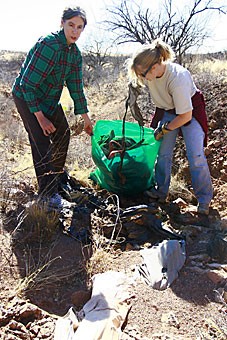
Georgia Ehlers, director of the Peace Corps Fellows at the UA, left, and Carrie Jacobson, a returned Peace Corps volunteer, clean up trash most likely left by illegal immigrants crossing the Arizona-Mexico border on Saturday.
The morning sun reflected off Benjamin McDonald’s sunglasses as he dragged a plastic bag along the side of a remote highway in the desert. A business graduate student and Peace Corps Fellow, McDonald spent his Saturday morning in the Sonoran desert picking up trash. McDonald was one of 37 returned Peace Corps volunteers who joined about 200 volunteers from other groups Saturday morning to clean up trash left by undocumented migrants crossing the desert into Southern Arizona from Mexico.””I wanted to expose myself during my time at the University of Arizona to the issues that affect the local community, and border issues are a significant part of that,”” McDonald said. The service project marked the end of Peace Corps Week, which celebrated the 46th anniversary of the founding of the Peace Corps. The project featured the work of Peace Corps Fellows, who are returned Peace Corps volunteers attending graduate school at the UA. With 57 fellows, the UA has the second-largest group of Peace Corps Fellows out of 47 schools in the nation, said Georgia Ehlers, coordinator of internships and community engagement at the Graduate College and director of the UA Peace Corps Fellows. Volunteering and internships that address issues in the local community is a part of being a Peace Corps Fellow, Ehlers said.””We looked at a couple of projects,”” Ehlers said. “”I think that they are interested in border migration issues and this was an opportunity to come out in Southern Arizona and do a project together, see the desert and learn more about the migrants.””Volunteers picked up trash in desert areas west of Arivaca Junction and Amado, off Interstate 19. The land was purchased in 2004 by Pima County and Pima County Natural Resources Parks and Recreation using open-space bonds, said Kerry Baldwin, natural resources division manager for Pima County Natural Resources Parks and Recreation. The land is managed by Pima County NRPR and local ranch managers.The desert is primarily used by grazing herds and for hiking, hunting, horseback riding and other recreational activities.The area has always had a high level of traffic from people crossing the border, Baldwin said. “”Depending on where the border patrol concentrates its efforts, you kind of see an ebb and flow,”” he said. Arizona has seen an increase in the number of border crossings since the late 1990s, said Rev. Robin Hoover, founder and media representative of Humane Borders, a nonprofit organization that aims to decrease the number of migrant deaths in the Arizona desert.More border control in Texas and California has resulted in more undocumented migrants crossing into the U.S. through Arizona, which has more hostile terrain, Hoover said.The increase in undocumented migrants has been causing environmental problems in the areas they cross.The trash left behind – things such as backpacks, empty water jugs and toiletries – can break down into smaller pieces that may be eaten by grazing animals. “”We have a problem with (migrants) cutting fences and breaking water systems, which makes it difficult for our grazing operation,”” Baldwin said.Abandoned cars are also found deep in the desert, left by migrants who drove them as far as they would go before breaking down, Baldwin said. Ehlers and the returned Peace Corps volunteer she was working with, Pima Community College nursing student Carrie Jacobson, used the remnants of one abandoned car as a landmark for the area they were cleaning. The rusted door lay half buried in sand and marked the intersection of two washes. For many, including Ehlers, Jacobson and McDonald, Saturday was their first experience in the desert picking up trash. All three said they would be interested in doing it again.””This is amazing,”” Jacobson said. “”I had no idea. I mean, to see all the backpacks, underwear, the children’s stuff.””The experience of picking up trash made the reality of immigration come alive for McDonald.””It makes you wonder about who these people are, why it is they dropped the things they dropped,”” McDonald said as he hoisted the plastic bag over his shoulder and looked toward the desert.